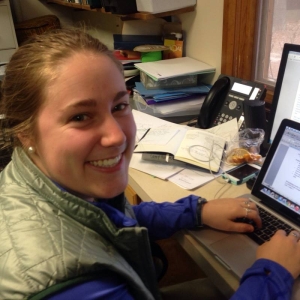By Sarah Shimer
Sarah Jeanne Shimer is a former Camp Hanover camper and Pathfinder currently attending Colby College in Maine. This winter, Sara completed an Enivironmental Ministries Internship with Camp Hanover. Sarah’s next adventure is a semester studying abroad in New Zealand.
 This winter break, much like any other break from college, I frequently encounter the questions “Where are you in school?” and “What are you studying?” Once I explain that Colby College is a small, liberal arts school in Waterville, Maine and answer questions about how much snow is on the ground, I then move on to answer what I’m studying. Religious Studies and Science, Technology, and Society with a focus in Environmental Studies. About halfway through this mouthful, I usually get a look of surprise, quickly morphing into confusion, then followed by comments such as “how do those even relate?” or the million-dollar “what are you planning on doing with that?” question. I tend to respond to these questions with the stock answer that I’m still trying to figure out what I want to do but that I see these majors coming together in the area of environmental ministry. Is the path I’ve chosen to take in some ways unconventional? Yes. Do I have moments of panic wondering what I will do with my life? Yes. But I have found myself worrying about these questions less as I learn more about Presbyterian Environmental Ministry programs.
This winter break, much like any other break from college, I frequently encounter the questions “Where are you in school?” and “What are you studying?” Once I explain that Colby College is a small, liberal arts school in Waterville, Maine and answer questions about how much snow is on the ground, I then move on to answer what I’m studying. Religious Studies and Science, Technology, and Society with a focus in Environmental Studies. About halfway through this mouthful, I usually get a look of surprise, quickly morphing into confusion, then followed by comments such as “how do those even relate?” or the million-dollar “what are you planning on doing with that?” question. I tend to respond to these questions with the stock answer that I’m still trying to figure out what I want to do but that I see these majors coming together in the area of environmental ministry. Is the path I’ve chosen to take in some ways unconventional? Yes. Do I have moments of panic wondering what I will do with my life? Yes. But I have found myself worrying about these questions less as I learn more about Presbyterian Environmental Ministry programs.
Growing up in the Presbyterian Church and spending my summers at Camp Hanover, a Presbytery of the James-affiliated camp, greatly influenced the path I chose. I grew up associating many of the times I felt closest to God with the times I spent outdoors. For me, the two seemed to go hand-in-hand. But I hadn’t explicitly focused on how deeply this relationship was rooted in my beliefs until I started exploring environmental ministry. While reading more about this subject, numerous times I was struck by a sentence or idea that mirrored exactly the way I felt but had never articulated. This idea that, as Christians, we are called to protect God’s creation is so important and must be discussed.
As the environmentalist movement grows within the PC(USA), Camp Hanover is looking to incorporate it into their programs. One way they put this goal into action was by hiring a Director of Youth, Environment, and Service ministries, Colleen Earp. When I heard about the new position, I realized this was a perfect opportunity to explore the field of environmental ministry through hands-on experience. So my role at Camp Hanover has now shifted from camper to intern as I work with Colleen for the month of January. With her guidance, I have put together two Sunday School lessons entitled “Why should Christians care for the environment?” and “What are Presbyterians doing for the environment?” The lessons explore the biblical basis for a Christian environmental ethic and discuss actions the PC(USA) has taken. Sunday School lessons provide an opportunity to educate and initiate these important conversations in churches.
As Psalm 24:1 states, “The earth is the Lord’s and everything in it, the world, and all who live in it.” The earth and everything in it has intrinsic value because God created it. If we shift from an anthropocentric to a theocentric worldview, then we place God as the central focus rather than humankind. In doing so, we can practice theocentric stewardship, meaning we are stewards of the earth not for ourselves, but for God. As Christians, this is how we should interact with the environment. Over the past year as I have learned more about this field, I have become increasingly excited for the Presbyterian Church. Many valuable programs exist such as Presbyterians for Earth Care or Eco-stewards, but I believe we are just at the tip of the iceberg. I am filled with hope and curiosity as I think about the conversations and programs that will emerge in the future. These are programs and conversations that I want to be part of as I continue to explore the area of environmental ministry. Although I have no doubt that I will still receive many confused looks as I explain what I am studying, I feel like I am finding a community within the Presbyterian Church that combines my passion for religion and environmental stewardship.
